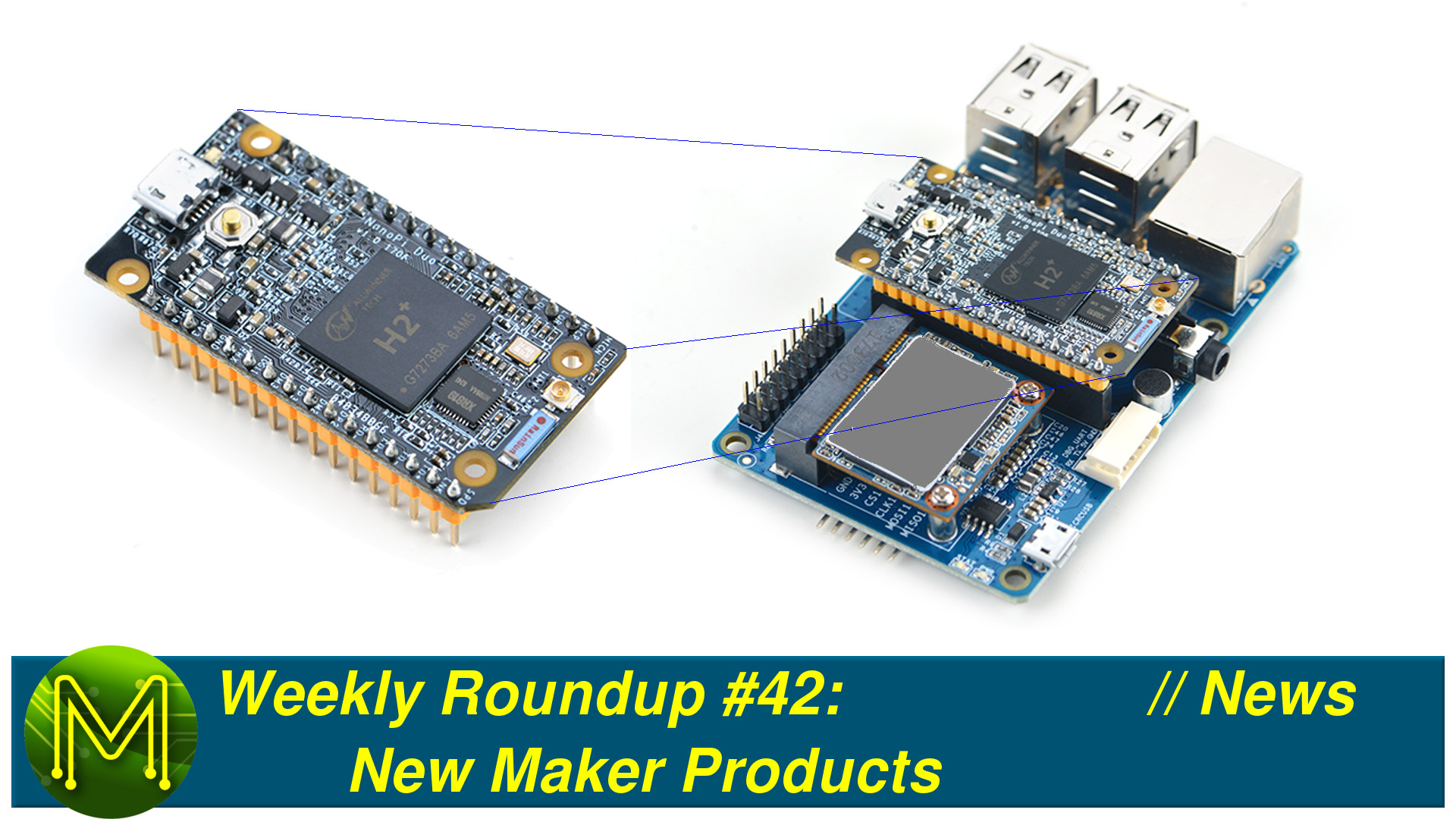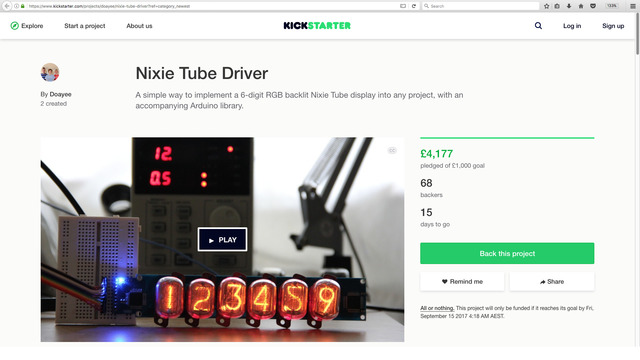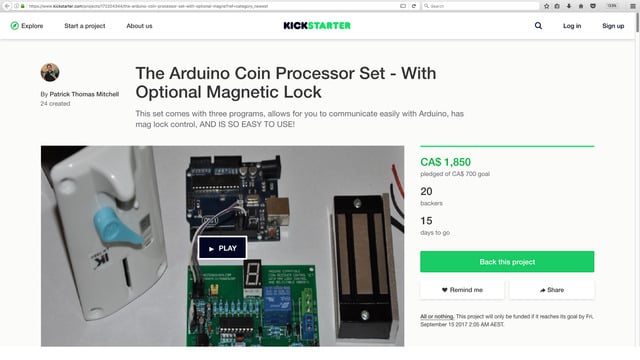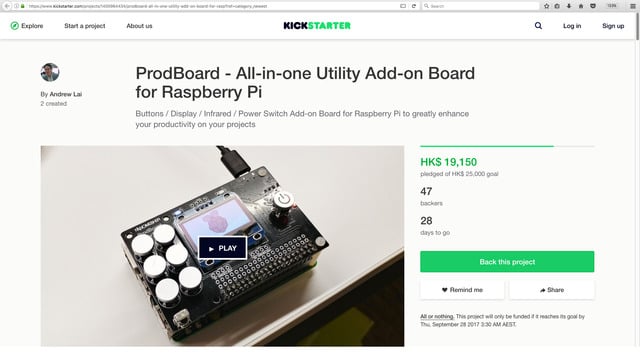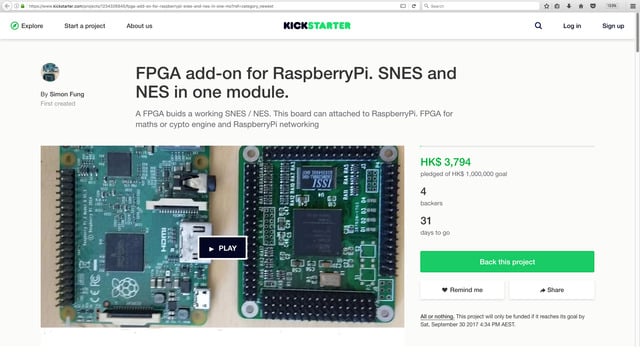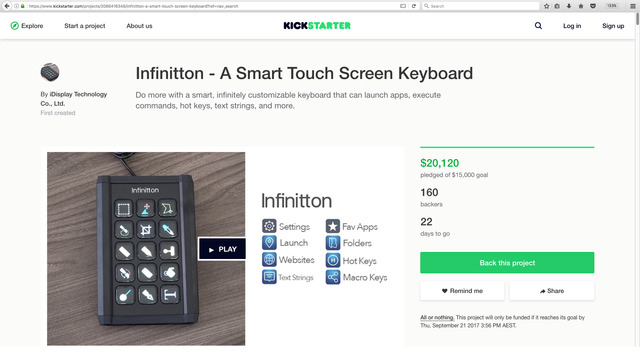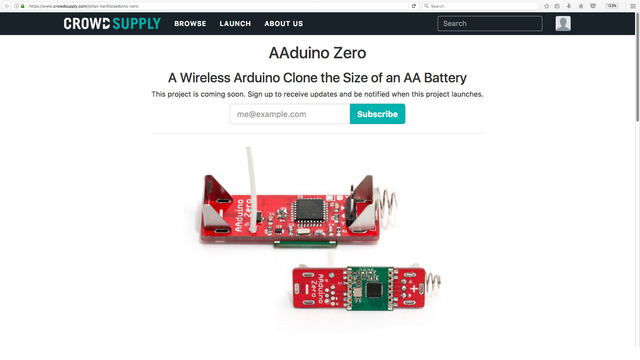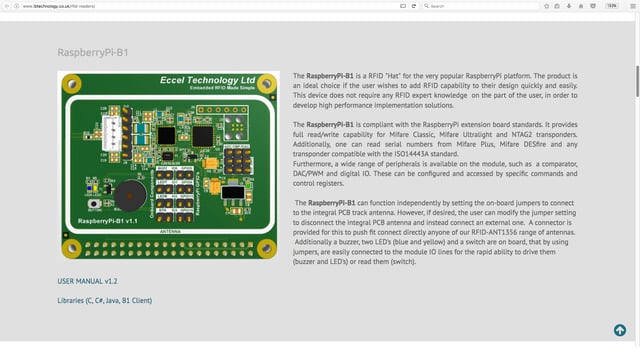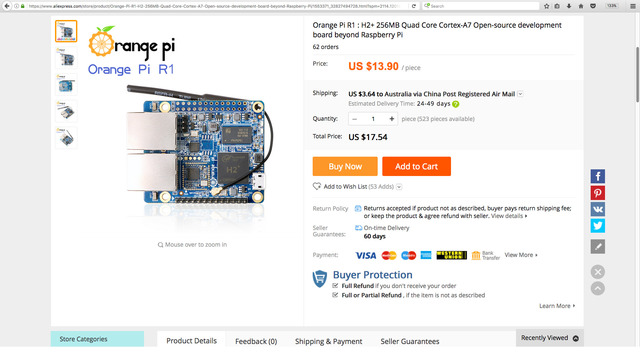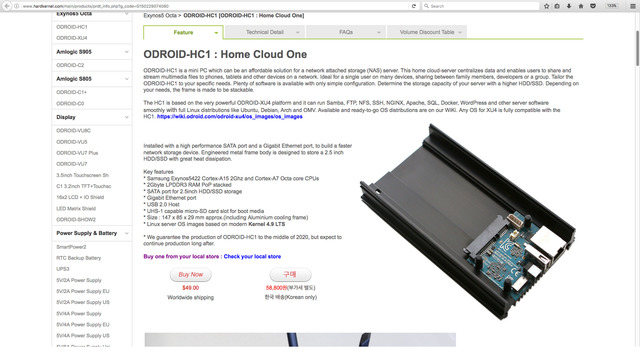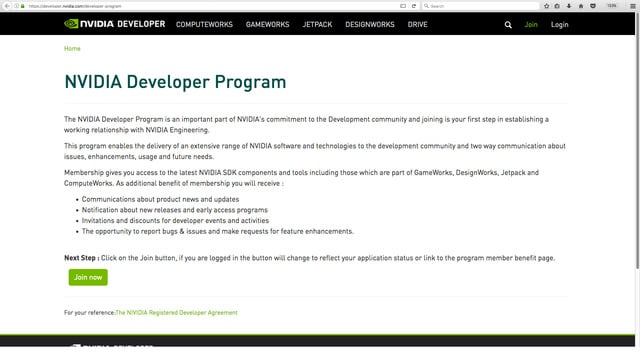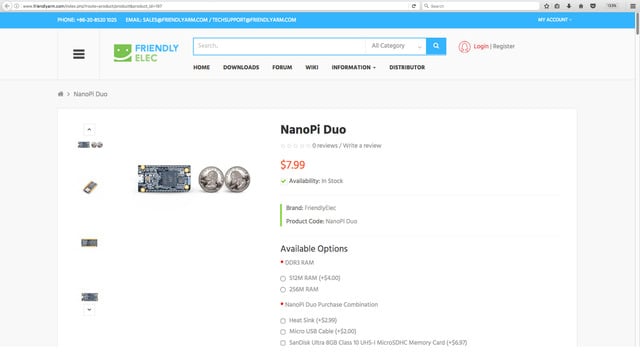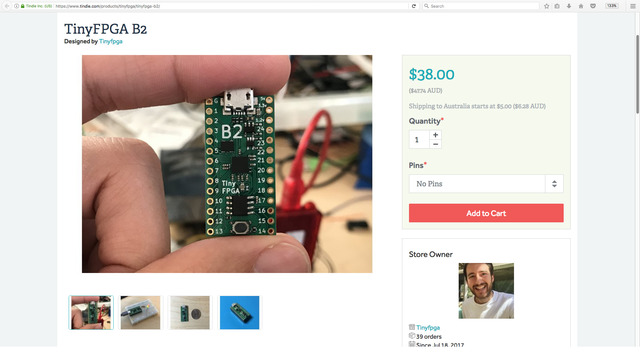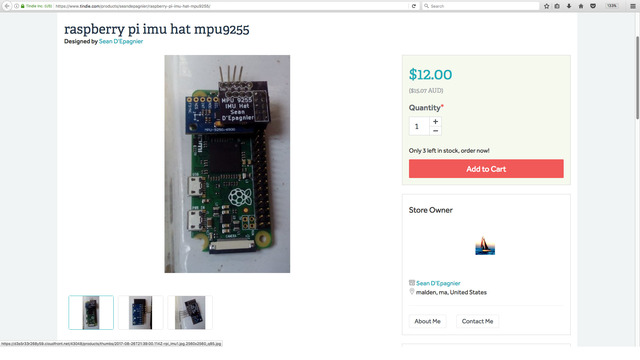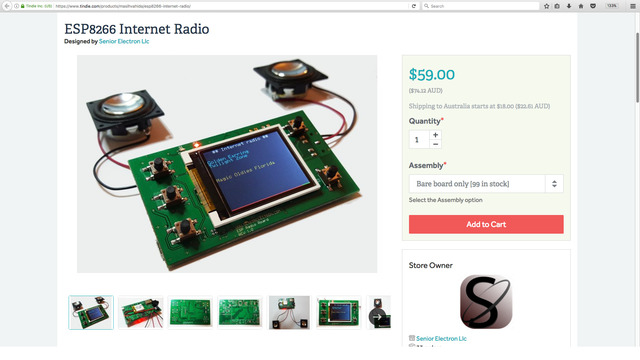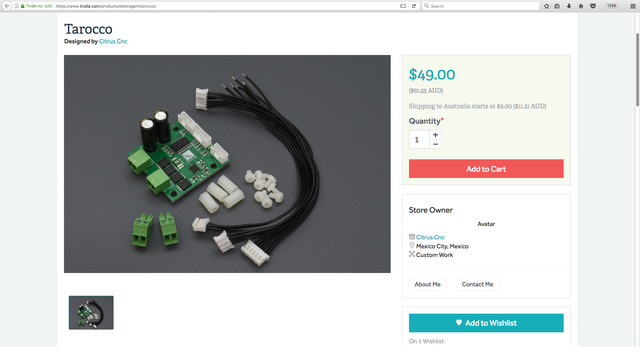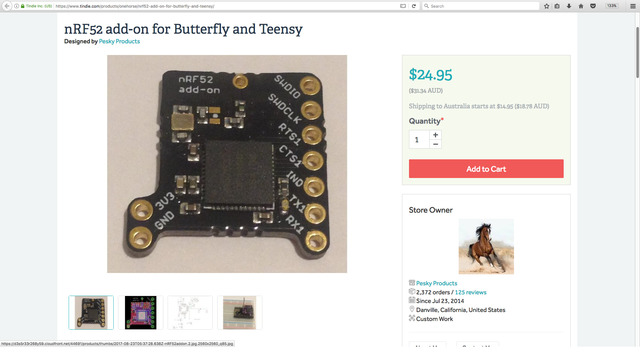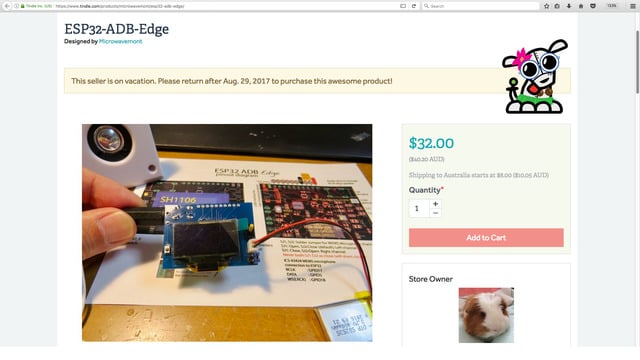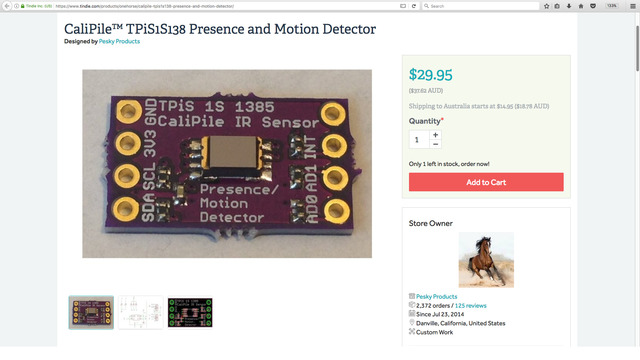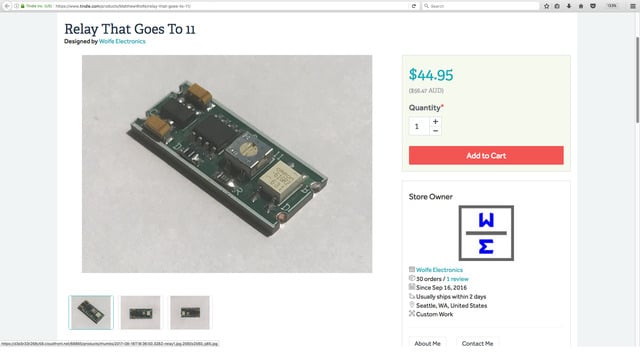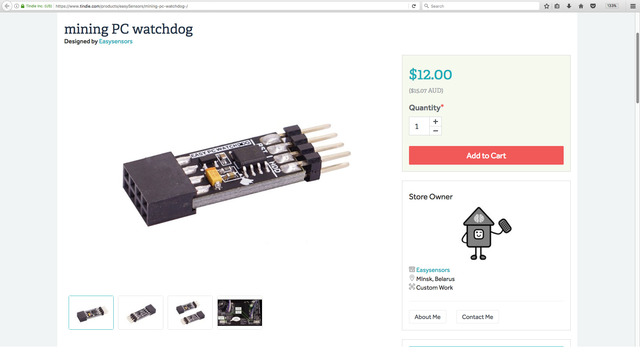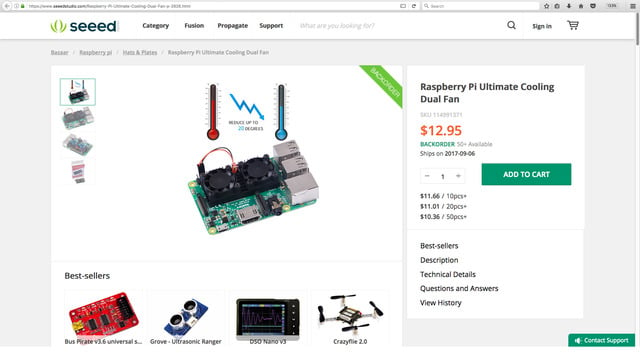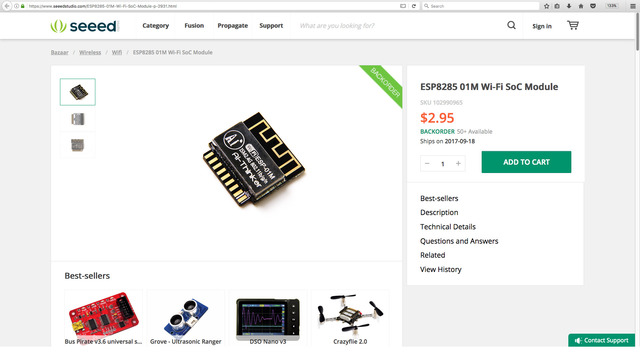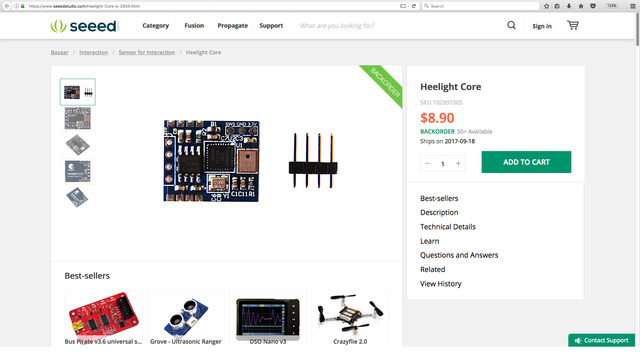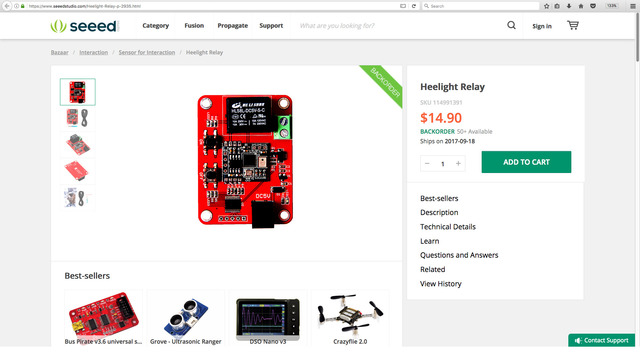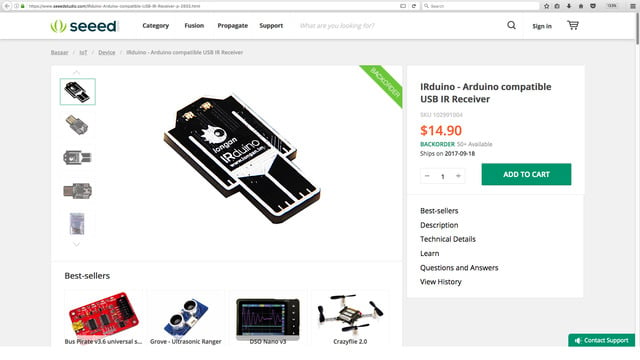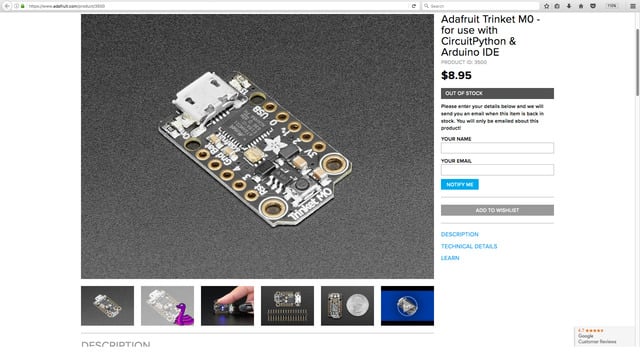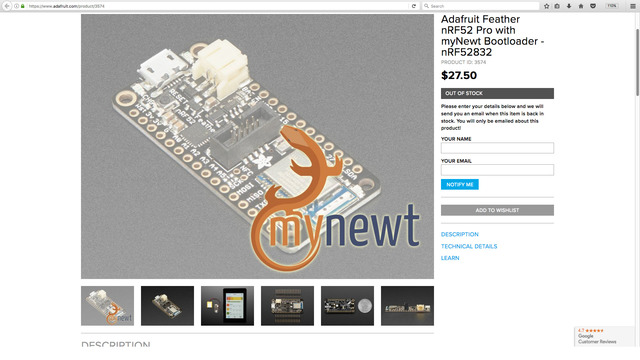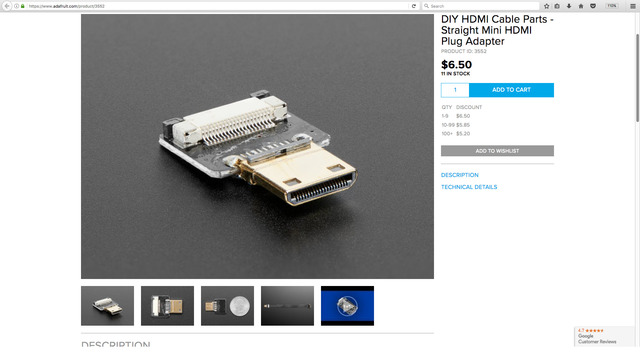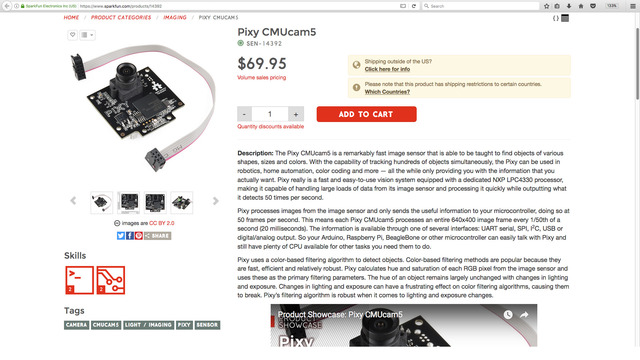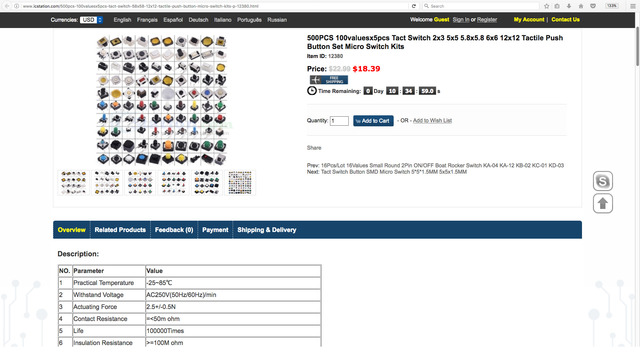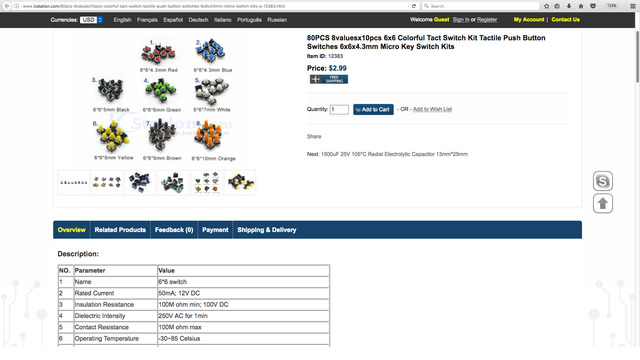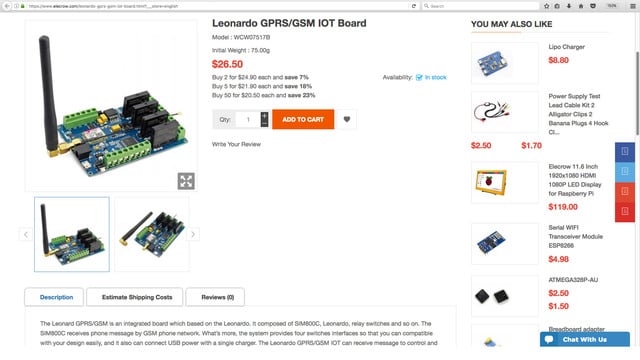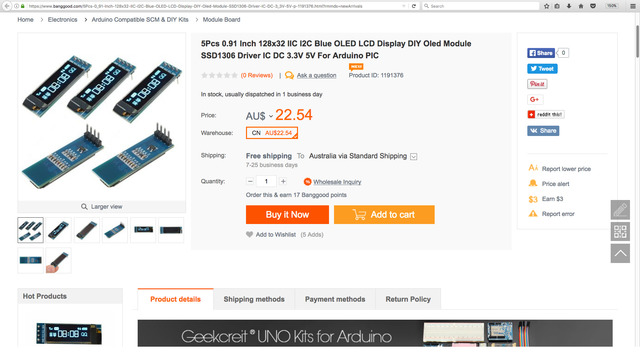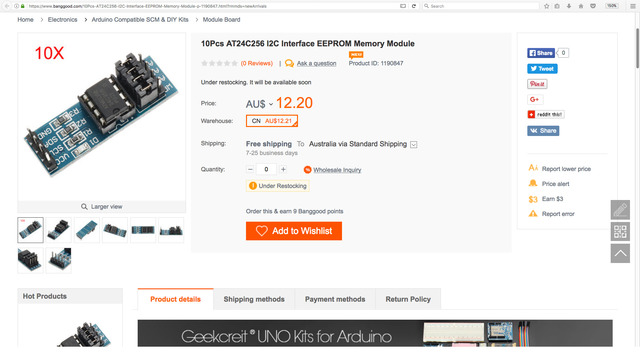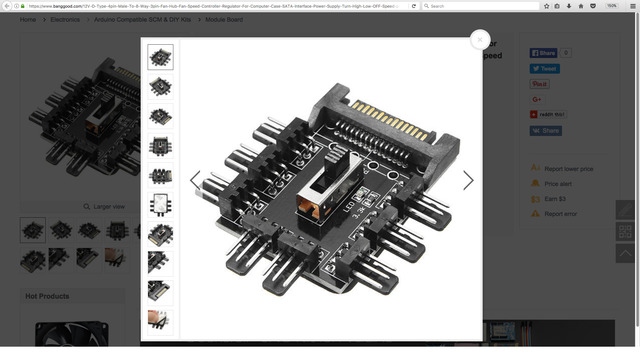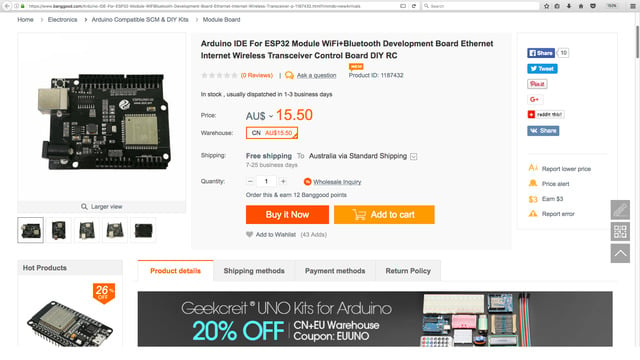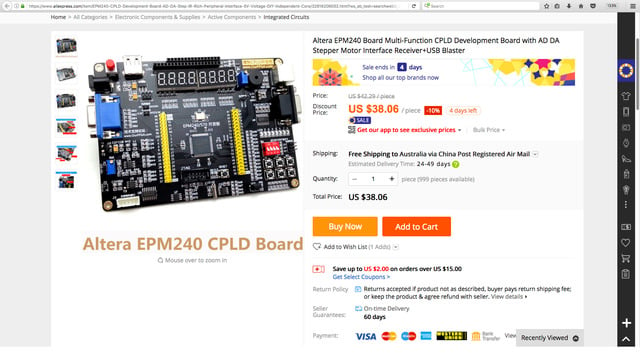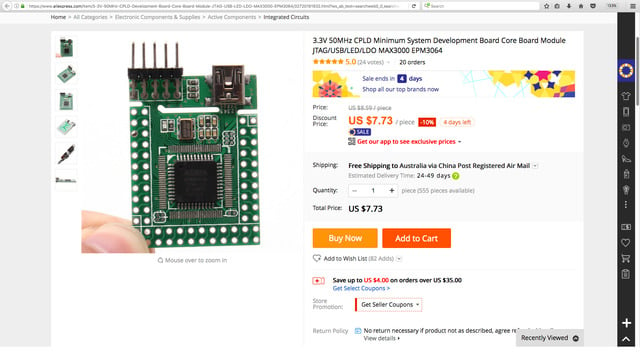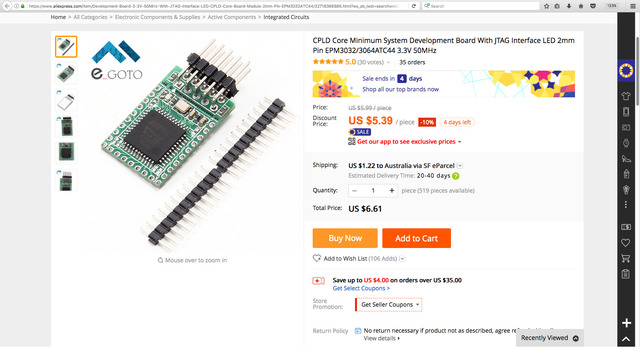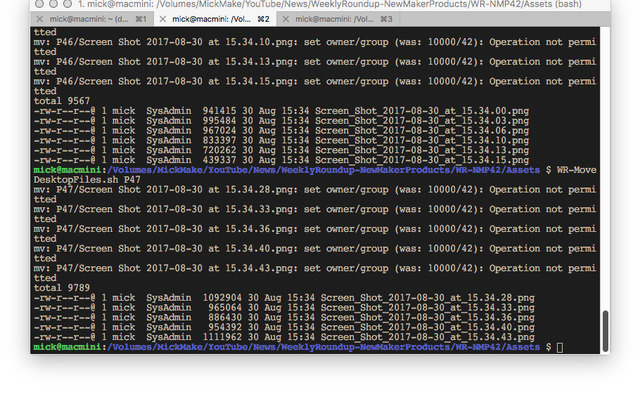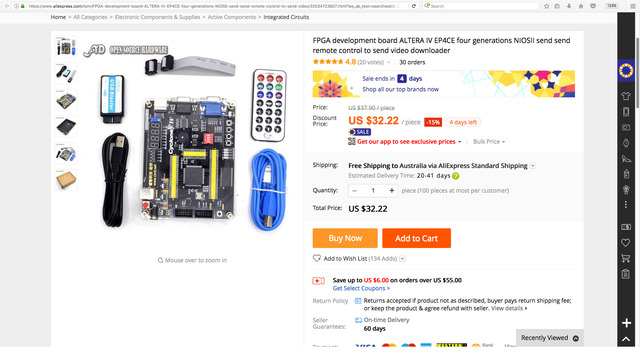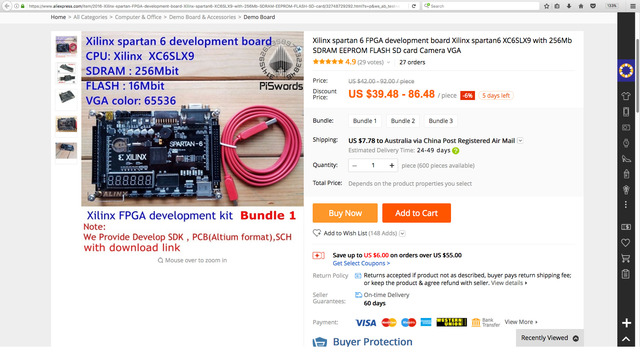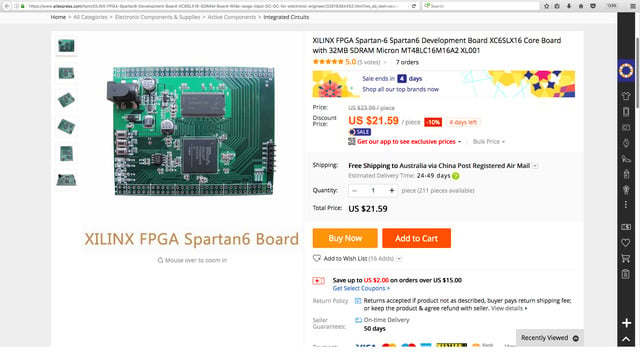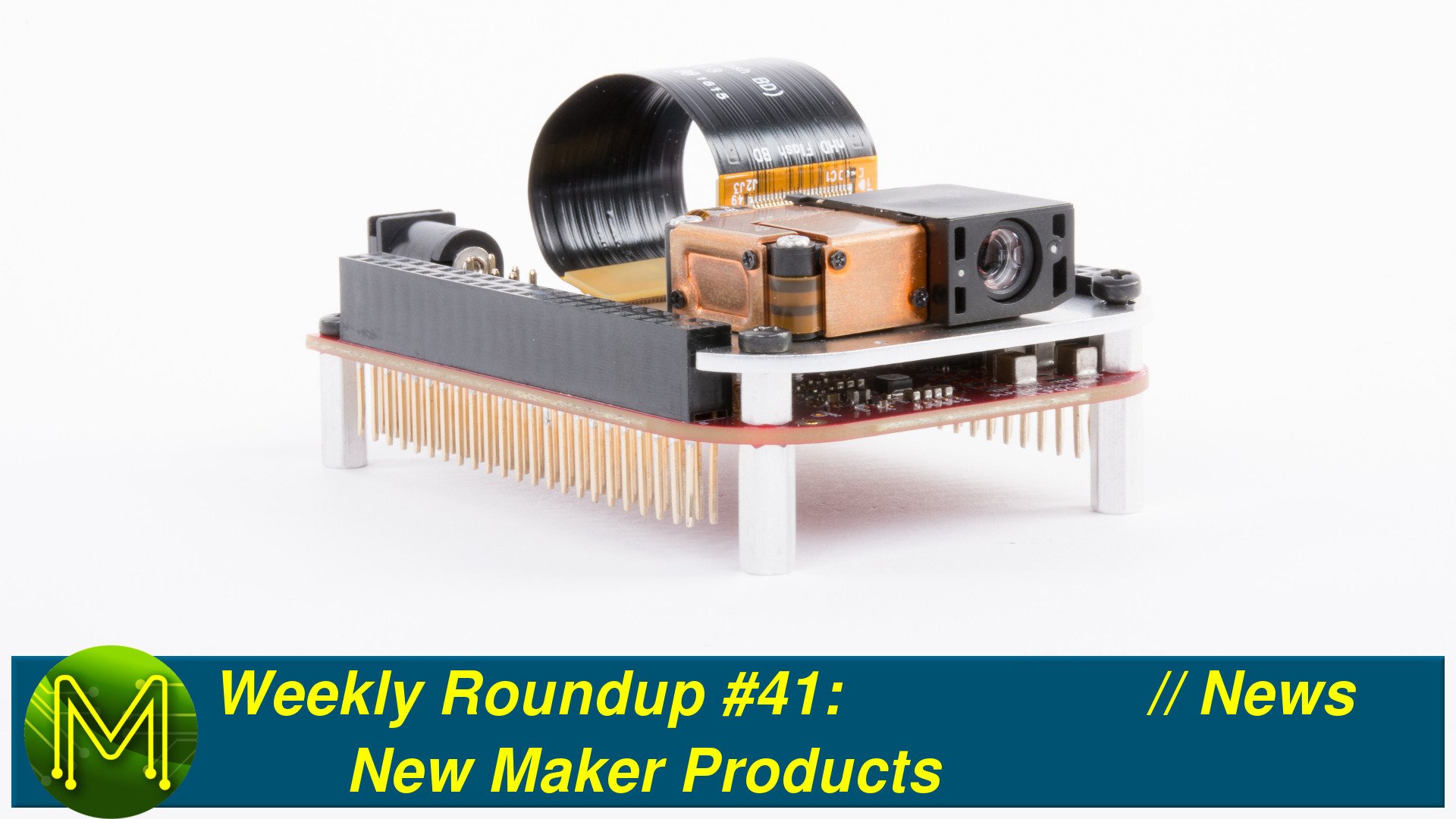Weekly Roundup #42 - New Maker Products // News
This week’s Weekly Roundup is pretty special, because it’s episode number 42! It also has FPGAs, SBCs, even more FPGAs and something that goes up to 11.
Crowd Funding
KickStarter
There’s not a heck of a lot happening on Kickstarter at the moment.
Nixie Tube Driver
but, here’s another simple Kickstarter campaign for a Nixie tube driver using the HV5122 driver from Microchip. A fairly decent one and this also has RGB LED backlights.The Arduino Coin Processor Set
and a coin slot processor kit created by Patrick Thomas which is his 24th campaign. It’s a board based on a PIC18F1220 IC and provides connectivity to an Arduino or similar and a freestanding mode allowing control over door locks and actuators.Turtle Rover
This next one is interesting. The Turtle Rover is a small robot designed on the Mars Rover. It’s a Raspberry Pi powered robot with Rocker-bogie suspension and water-tight chassis allowing it to cross some hostile terrain. Even with added features such as WiFi, 1080p video streaming and robotic gripper arm it is expensive coming in at almost 1700 euros, but they offer a beta-tester option where you can drive this thing remotely on 3, one and a half hour missions of various complexities.ProdBoard
And here’s another campaign for a button and display board for the Pi. Has 6 buttons, 1.3" OLED display, power switch, IR and 3 I2C ports. Not sure if they are 3 separate buses, or just a daisy chained connector though.FPGA add-on for RaspberryPi
And my prediction of FPGA boards hitting the main-stream Maker is starting to happen. This board is a Pi hat containing a Xilinx FPGA, which will happily emulate a NES in silicon, although the SMD footprint will allow higher density FPGAs giving you more grunt. If you’re a retro gamer, then I’d start becoming very interested in FPGAs as you will be able to emulate even the more complex arcade and console games that are currently impossible to play on existing hardware.Infinitton
This next one isn’t really a Maker product, but there seems to be a rise in smart keyboards, which are just USB keyboards with programmable buttons. I’ve been looking for things like this as I want to build my own video editing console. This was interesting as it uses a capacitive touch OLED display with conductive transparent buttons on top. So you get the tactile feel of buttons with a cheap OLED display underneath.UPDATE: It’s also on IndieGoGo!
IndieGoGo
Surprisingly, nothing on IndieGoGo, and …
Crowd Supply
CrowdSupply only has one interesting thing.
AAduino Zero
The AAduino is a small board containing an STM32 MCU, LoRa RFM69 and TMP102 temperature sensor. It fits into the same space as a double A battery. So all you need to do is put it into a one of those double A battery packs, connect up power and ground and you’re away.Honorable mentions
Raspberry Pi Hat RFID/NFC Board
Over in the UK, Eccel Technology have several RFID boards supporting both reading and writing of all the RFID card types. This one is a USB based board allowing connectivity to a PC. Then there’s a Pi hat, which also breaks out several useful GPIOs for buzzers and buttons. And two other standalone boards. RS Online currently has it for 33 British Pounds.Khadas VIM2
Another SBC to be excited about, the Khadas VIM2 is here! This board is a step up from the previous by running the 8core Amlogic S912, HDMI 2.0 up to 4K at 60Hz, GbE, WiFi, Bluetooth, USB2.0, sadly, SD slot, and either 2G or 3G DDR4 RAM and 16, 32 or 64G eMMC depending on which model you get. It comes in Basic, Pro and Max. Power is via USB-C or interestingly via on-board pogo pads with a 4A current limiting switch.Orange Pi R1
And just when you thought the strange product names were over with; The Orange Pi guys have come out the Orange Pi R1! This SBC has the same AllWinner H2 SoC as the original Pi Zero, but has two 100MbE ports, which I’m assuming is the reason for the “R1” name as they might be aiming this as a small router. Although one of the Ethernet ports is driven off USB, so not sure about the throughput.ODROID HC1
In Weekly Roundup #41 I mentioned the ODROID HC1, well now it’s up at HardKernel for the slated US$49.Jeston TX1 for US$199
Back in Weekly Roundup #28 I mentioned the NVIDIA TX1, which is a pretty decent board, but comes at a hefty price of around US$600. Now NVIDIA are making it available for around US$200. The only catch is that you have to join up to the NVIDIA Developer Program, which will be screened, but a good option to get your hands on one.NanoPi Duo
One of my Patreons, Mike Schinkel, sent me this one.The Friendly guys have come out with a variant of their NanoPi called the NanoPi Duo. It’s a breadboard style SBC that runs the AllWinner H2+, 512MB RAM, SPI flash, SD slot and WiFi. Measures only 25 by 50mm and breaks out ethernet, USB and a bunch of GPIOs. You can use it standalone, or plugged into this. Which is a Pi form factor board containing USB, ethernet, small Pi header and an mSATA slot. Nice!
Raspbian running on Debian Stretch
If you’re a Raspberry Pi fan, then you’ll be pleased to know that Raspbian has been upgraded to support Debian Stretch. Of course you could have always hacked in Stretch, but good to see it officially supported in Raspbian.Maker Shops
Tindie
Tindie has some interesting stuff this week.
TinyFPGA B2
The Tindie store has released several FPGA boards. Here’s another one that runs the 16MHz clocked ICE40LP8K FPGA with a 4Mb SPI flash loader and 23 GPIOs running off a 3.3v supply.Customizable Keyboard shield
And here’s a couple more of the customizable keyboards. This one based on an Arduino Uno with long stroke keys, and this one with short stroke, clicky keys. Both are accessed via I2C or UART.raspberry pi imu hat mpu9255
This small Pi hat has an on-board MPU9255 9DOF IMU and is designed to take up the least number of GPIOs. This IMU has it’s own on-board Digital Motion Processor which offloads a lot of the complex Fusion algorithms.ESP8266 Internet Radio
This is a cool board based on the open source EspRadio. Contains everything you need to stream Internet Radio channels, with 1.8" TFT, battery management, audio amplifier and headphone jack.Tarocco
Tarocco is a closed loop DC motor controller with quad encoder feedback. It’ll allow steps of up to 3,200 per revolution driving a 36V, 10A motor. It also has current limiting to avoid motor burnout and torque control.nRF52 add-on for Teensy
Here’s a fairly small add-on for the Teensy from Pesky Products, giving you access to an nRF52832 Bluetooth module.ESP32-ADB-Edge
Here’s a small board that will interface to Amazon Alexa. Contains an ESP32, ICS43434 MEMS mic, MAX98357 DAC, OLED and LiPo charging. Just enough to create your own tiny Amazon Echo.CaliPile™ TPiS1S138 Presence and Motion Detector
Another one from Pesky Products. This time a small CaliPile thermopile IT temperature sensor. These ICs are pretty cool and will allow you to detect human presence fairly accurately. Connectivity is via I2C and there’s also an interrupt out, so you can wake up a sleeping MCU.Relay That Goes To 11
If you haven’t ever seen Spinal Tap, I’d suggest to reading this article, go and watch it and then come back, because you won’t understand this “Relay that goes up to 11”. Simply, it’s a timed relay that will switch a certain duration after power is cut. The really good thing about this? This one goes to 11!PC watchdog
This next one is a cool idea. Originally designed for BitCoin mining, it will monitor your PC for lockups and automatically reboot. Of course if you were running a Real Operating System, like Linux, (cough cough), you wouldn’t ever see any lockups.AdaFruit, Seeed, SparkFun, DFRobot, DigiKey
There’s a couple of interesting things in from the major storefronts this week.
Raspberry Pi Ultimate Cooling Dual Fan
Seeed Studio have an excellent heatsink and dual cooling fan unit for your Pi. This one isn’t PWM controlled, but is a great addition for for any Pi.ESP8285 01M Wi-Fi SoC Module
They also have the tiny ESP8285 WiFi SoC module, which breaks out 14 GPIOs onto a small edge connector.Heelight Core
Back in Weekly Roundup #36 I mentioned the Heelight Grove board. Well Seeed now have the Heelight Core module. Accessible by UART on three different connector styles, it’ll give you an audio processing unit that detects sounds that can be generated by humans such as whistling or even DTMF tones.Heelight Relay
They also have a small relay board that the module can be soldered to, giving you a 240v, 5A relay powered from a 5v DC jack.IRduino
They also have the IRduino, which is a small ATmega32U4 based board with IR sensor and a couple of RGB LEDs. Easy add-on to any SBC or PC that doesn’t have an IR receiver.Adafruit Trinket M0
Over at AdaFruit they have their Trinket M0, which runs the mighty SAMD21 packed into this tiny board. They ship it with CircuitPython firmware, and only pushing out 5 of the 26 GPIOs the SAMD21 is capable of.Adafruit Feather nRF52 Pro
They also have the Feather nRF52 Pro, which runs the now common nRF52832 Bluetooth module. It contains all the usual Feather options, like LiPo charging, but this board is designed to be used with MyNewt RTOS. So you won’t be able to use the Arduino IDE with it.DIY HDMI Cable Parts
They also have a bunch of HDMI converters which are really handy if you have a screen with a flat ribbon cable.Pixy CMUcam5
Over at SparkFun they have the Pixy cam5 back in stock, which offloads image processing for you. Capable of keeping up with the 640 by 480 50Hz on-board camera, can recognize and track objects within frame.GPS Mouse
They also have in a 72 channel GPS receiver with onboard compass. Really useful thing to have for Autonomous Vehicles.The Cheap Side
There’s a whole bunch of interesting things from China this week.
500x microswitches
Over at ICstation they are offloading 500 switches for less than US$20, which works out to around 4c per switch.80x microswitches
Or 80 plain through-hole PCB buttons for only 3 bucks! Stock up on switches!Leonardo GPRS/GSM IOT Board
EleCrow have an Arduino Leonardo compatible board with on-board SIM800 GSM module and four relays. Good if you’re in countries supporting the SIM800, but from what I hear it isn’t officially supported in Australia.128x32 I2C Blue OLED
BangGood have these cheap .9" OLED displays. I’ll be picking up a couple of these for my Uber video editing console.AT24C256 I2C EEPROM
and if you’re ever in need of an I2C EEPROM these are pretty handy for prototyping and cheap as well.Linear Current Sensor
There’s also this handy hall effect current sensor breakout, which will translate a 0 to 50A pass through current to a 0 to 3v voltage level. These are pretty cheap, but note as of June this year this particular chip has been discontinued.USB ISP AVR programmer
If you want to program a board that has an ISP header, you’ll need one of these. It’s a simple enough board with USB port one end and an ISP header the other.SATA Fan Speed Controller
If you have a PC requiring a lot of cooling, or just have an Uber cluster running, then this simple board breaks out 8 fan headers from a single SATA power connector. No PWM, just a simple off, low and high switch.ULN2003 Stepper Motor Driver Board
This is pretty cool. 10 ULN2003 stepper motor driver boards for less than US$10. Nice.ESP32 Module
And then there’s this Arduino compatible board running the ESP32. Handy if you want to experiment with them easily.Altera Max II EPM240 CPLD Dev Board
Now during my searches I came across a bunch of FPGA and CPLD boards on AliExpress. There’s this one, based on the Altera EPM240, which isn’t really an FPGA, but a CPLD. However, thought that this was a good board to get if you wanted to experiment with buttons, LEDs, and UARTs being driven from a CPLD. There’s also this one with, which is cheaper.Altera EPM3064 CPLD Dev Board
Then there’s this Altera EPM3064 CPLD board, breaking our 66 GPIOs coming from this chip. Has a microUSB and programming header than can be broken off after programming.Altera EPM3032 CPLD Dev Board
Or this one based on the Altera EPM3032 CPLD.Xilinx XC9572XL CPLD Dev Board
Or this one based on the Xilinx XC9572 CPLD.Altera IV EP4CE FPGA Dev Board
However, if you want some grunt behind your real time applications, then there’s this board based on the Altera EP4CE FPGA. Gives you a bunch of buttons, LEDs, UARTs, USB and GPIO headers. Or this smaller version with just the FPGA and supporting circuitry.Xilinx Spartan6 XC6SLX9 FPGA Dev Board
Another step up for FPGAs is the Xilinx XC6SLX9. This board has 256MB SDRAM, EEPROM, SD card, and VGA camera support. This is one FPGA that you can start to do real-time video analysis with.Xilinx Spartan6 XC6SLX16 FPGA Dev Board
Or these boards running the Xilinx XC6SLX16, which is a step up from the LX9 series. These boards don’t have all the extra bits, so would be useful for people already familiar with FPGAs.Honorable mentions
A few bits and pieces that I didn’t include in my video.

